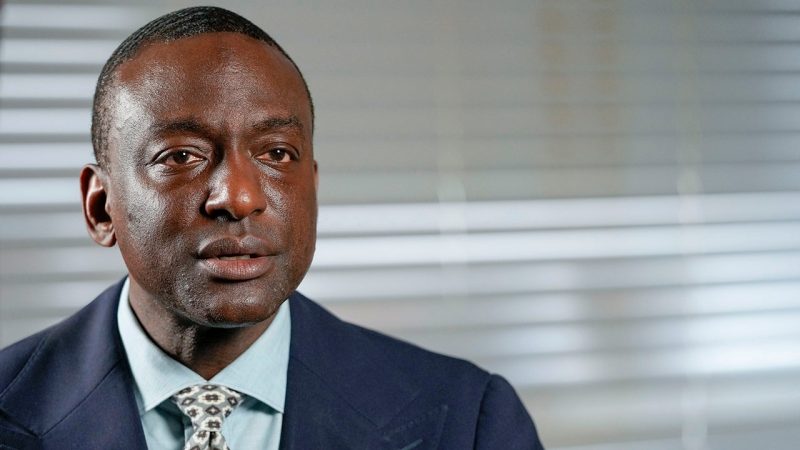
Yusef Salaam, exonerated member of the ‘Central Park Five,’ wins Democratic primary for seat on NYC council
Yusef Salaam, one of the exonerated ‘Central Park Five,’ has won a Democratic primary for a seat on the New York City Council, all but assuring him of eventual victory. It’s an improbable feat for a political novice who was wrongly accused, convicted and imprisoned as a teenager for the rape and beating of a white jogger in Central Park.
The Associated Press refrained from calling the race on election night, but vote tallies released Wednesday showed him to be the clear winner to represent Central Harlem. Salaam is not expected to face a serious challenge in November’s general election, if any.
It is time, he said, for ‘a new Harlem renaissance.’
‘To have a voice from a person who’s been pushed into the margins of life — someone who has actually been one of those who has been counted out — is finally having a seat at the table,’ Salaam said in an interview Wednesday.
‘Harlem is such a special place that it is known as the Black Mecca,’ he said. What happens in Harlem ‘reverberates around the world.’
Salaam and the four other Black and Latino teens from Harlem became known as the Central Park Five after their arrest in 1989 in the headline-grabbing rape, one of the city’s most notorious and racially fraught crimes. He served nearly seven years in prison before the group was exonerated through DNA evidence.
His outsider campaign prevailed over two political veterans — New York Assembly members Inez Dickens, 73, and Al Taylor, 65 — in his first bid for public office. Democratic socialist Kristin Richardson Jordan, the incumbent council member, dropped out of the race in May but remained on the ballot.
Salaam declared victory on election night with his vote tally barely exceeding 50%, although an unknown number of absentee ballots had yet to be counted. But his lead over Dickens, his nearest competitor, seemed insurmountable, and both she and Taylor conceded. New York City is still tabulating late-arriving mail ballots that could potentially push him back above the 50% threshold, in which case he will have won without the benefit of ranked-choice voting tallies.
‘When I think about the things that we need the most, of course on the top of everyone’s list are affordable housing, education and safe streets,’ Salaam told the AP.
While all three candidates focused on promoting affordable housing, controlling gentrification and easing poverty in Harlem, Salaam capitalized on his celebrity in neighborhoods that consider the Central Park Five — now the Exonerated Five — to be living symbols of the injustices faced by the Black and Latino residents who make up about three-fourth’s of the district’s population.
‘He comes from the neighborhood, and he was incarcerated then turned himself around,’ said voter Carnation France. ‘He’s trying to do something for the people.’
Others were looking for a change in leadership.
Zambi Mwendwa said she voted for Salaam because he is ‘a new face.’ She said her decision had nothing to do with the injustice in his past.
‘I’ve heard him talk. He seems to be talking about the things I care about,’ Mwendwa said on election day.
Salaam’s lack of experience in public office might have actually worked in his favor, according to Amani Onyioha, a partner at Sole Strategies, which ran phone banks and engaged residents on Salaam’s behalf.
‘In a time like this, when people are looking for a hero, they’re looking for somebody who can relate to them,’ Onyioha said.
‘I think people saw him as a survivor,’ Onyioha said. ‘He was vindicated and the system eventually ended up working out for him.’
Salaam moved to Georgia shortly after he was released and became an activist, a motivational speaker, an author and a poet. He returned only in December to launch his campaign.
Salaam was 15 when he was arrested along with Antron McCray, Kevin Richardson, Raymond Santana and Korey Wise, who served between five and 12 years in prison before prosecutors agreed to reexamine the case. DNA evidence and a confession ultimately linked a serial rapist and murderer to the attack, but he wasn’t prosecuted because too much time had passed. Their convictions were vacated in 2002 and the city ultimately agreed in a legal settlement to pay the exonerated men a combined $41 million.
A 2012 Ken Burns documentary called ‘The Central Park Five’ rekindled public attention on the men’s childhood saga. More recently, a 2019 television miniseries, ‘When They See Us,’ drew attention again, just before the Black Lives Matter Movement was launched in response to the killing of George Floyd by a Minneapolis police officer.
Donald Trump, who in 1989 placed ads in four newspapers before the group went on trial with the blaring headline ‘Bring Back the Death Penalty,’ later refused to apologize, saying all five had pleaded guilty — a reference to their coerced confessions. Salaam reminded voters of that in April, putting out his own full-page ad headlined ‘Bring Back Justice & Fairness,’ in response to one of Trump’s indictments.
<!–>
–>
